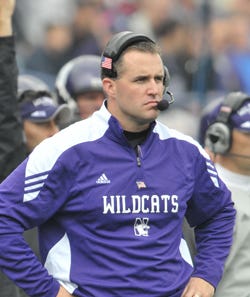Right and Wrong Lessons for College Journalists
Some stories are going to be painful, but they must be told
Heads are rolling across three college campuses this past week – two of them due to outstanding work by student journalists, and the third due to a misguided attempt to control what student journalists are taught.
First, the good news. Student reporters at Northwestern University did an outstanding job breaking a story of hazing in the school’s football program. Reporters at The Daily Northwestern in Evanston, Illinois, detailed stories by players who said they witnessed “absolutely egregious and vile and inhumane behavior” against younger players. The anonymous player who was quoted told the student journalists that younger players would be punished for mistakes on the field by being “dry humped” in a dark locker room.
The stories exploded on campus and led to the dismissal of longtime head football coach Pat Fitzgerald. The university said there’s no evidence Coach Fitz knew about the hazing, but even if he didn’t, he “should have known.”
The second student newspaper story ended up in the resignation of Stanford University’s president. The reporter, Theo Baker (son of New York Times White House correspondent Peter Baker), investigated claims of research misconduct in past academic papers by the Stanford’s president, Marc Tessier-Lavigne.
Theo Baker told the Los Angeles Times that he started receiving aggressive emails from a lawyer representing the school’s president, demanding a retraction. Stanford’s board of directors initially said it would investigate the stories, but ultimately investigated the president’s academic research into Alzheimer’s. That led to Tessier-Lavigne’s resignation.
These are the kinds of explosive stories that a lot of college newspapers would have squelched. I can imagine a faculty advisor telling student journalists, “This is way too embarrassing. People might lose their jobs. I might lose MY job!” That would have sent exactly the wrong message to aspiring journalists. Kudos to the journalism professors at Northwestern and Stanford for giving the young reporters the green light and backing them despite pressure from above.
The third recent story doesn’t have quite such a happy journalistic ending, although it resulted in the resignation of yet another university president. In Texas (of course), Texas A&M president M. Katherine Banks resigned following a controversy over the school’s failed attempt to hire a new professor to head the school’s journalism program.
A&M announced with much fanfare last month the hiring of Kathleen McElroy, who had been teaching at the University of Texas at Austin, to run A&M’s journalism school. Before McElroy could even make the move from Austin to College Station, McElroy’s offer of a tenured position at A&M fell apart when the school received pushback about her previous work on diversity, equity and inclusion.
McElroy has an excellent resume, having worked for 20 years at the New York Times. McElroy saw the original offer of a five-year contract suddenly turn into a one-year non-tenured contract. The political pushback to her DEI emphasis came from an alumni group and a conservative publication. McElroy ultimately backed out of the job. A&M’s faculty senate demanded to know why McElroy’s offer was pared back and the whole affair ended up in McElroy staying put at her current school and A&M’s president stepping down after a tense meeting with the faculty senate.
Fighting for control of student media outlets is not new. Good journalism often conflicts with priorities of university administrators, who like to control the message. Student journalists in Washington State last year battled against policies that allowed administrators to review stories before they were published. The students testified before the legislature that school rules requiring administrator approval could lead to students avoiding sensitive topics. Washington’s legislature passed a bill removing the pre-publication review rule – a win for student journalists.
These days, the desire to control the message seems stronger than ever. Politicians, school administrators, managers of all kinds can’t resist meddling. But when your school offers a journalism program, administrators must understand the rules are different. Journalism is special. The constitution says so. Journalists need to be free from political pressure. Some stories are going to be painful, but they must be told. The examples of the past two weeks prove that student journalism can have an impact. That deserves to be protected.





Timely journism. Thanks .
How the Constitution and that responsibility can be so misplaced in a college setting is just wrong! Somewhere journalism should be taught in a way that goes unhampered by intimidation and threats, although in life, one must contend with these sorts of things as a reality in a capitalist country where "money talks" and there in lies the rub!